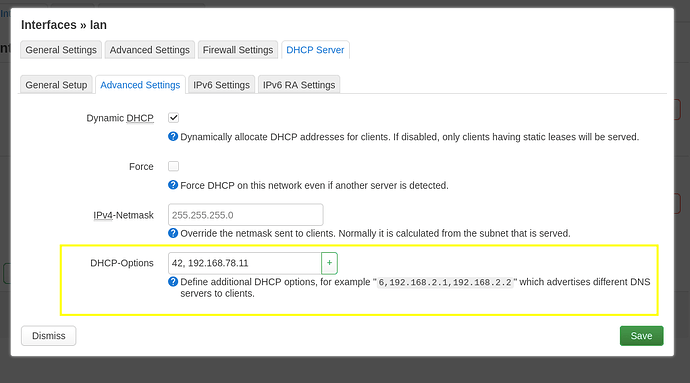For some weird reason my OpenWrt router does not serve time to LAN hosts. The configurations of this router are so basic that I can't believe I have to create this topic.
/etc/config/network
config interface 'loopback'
option device 'lo'
option proto 'static'
option ipaddr '127.0.0.1'
option netmask '255.0.0.0'
config globals 'globals'
option ula_prefix 'fd60:8825:2c7f::/48'
config device
option name 'br-lan'
option type 'bridge'
list ports 'lan1'
config interface 'lan'
option device 'br-lan'
option proto 'static'
option ipaddr '192.168.78.11'
option netmask '255.255.255.0'
config interface 'wan'
option device 'wan'
option proto 'static'
option ipaddr '192.168.100.100'
option netmask '255.255.255.0'
option gateway '192.168.100.1'
list dns '94.140.15.15'
option metric '10'
config interface 'wan79'
option device 'lan2'
option proto 'static'
list ipaddr '192.168.79.11/24'
option gateway '192.168.79.1'
list dns '94.140.15.15'
option defaultroute '1'
option metric '20'
/etc/config/firewall
config defaults
option syn_flood 1
option input REJECT
option output ACCEPT
option forward REJECT
# Uncomment this line to disable ipv6 rules
# option disable_ipv6 1
config zone
option name lan
list network 'lan'
option input ACCEPT
option output ACCEPT
option forward ACCEPT
config zone
option name wan
list network 'wan'
list network 'wan6'
list network 'wan79'
option input ACCEPT
option output ACCEPT
option forward REJECT
option masq 1
option mtu_fix 1
config forwarding
option src lan
option dest wan
# We need to accept udp packets on port 68,
# see https://dev.openwrt.org/ticket/4108
config rule
option name Allow-DHCP-Renew
option src wan
option proto udp
option dest_port 68
option target ACCEPT
option family ipv4
# Allow IPv4 ping
config rule
option name Allow-Ping
option src wan
option proto icmp
option icmp_type echo-request
option family ipv4
option target ACCEPT
config rule
option name Allow-IGMP
option src wan
option proto igmp
option family ipv4
option target ACCEPT
# Allow DHCPv6 replies
# see https://github.com/openwrt/openwrt/issues/5066
config rule
option name Allow-DHCPv6
option src wan
option proto udp
option dest_port 546
option family ipv6
option target ACCEPT
config rule
option name Allow-MLD
option src wan
option proto icmp
option src_ip fe80::/10
list icmp_type '130/0'
list icmp_type '131/0'
list icmp_type '132/0'
list icmp_type '143/0'
option family ipv6
option target ACCEPT
# Allow essential incoming IPv6 ICMP traffic
config rule
option name Allow-ICMPv6-Input
option src wan
option proto icmp
list icmp_type echo-request
list icmp_type echo-reply
list icmp_type destination-unreachable
list icmp_type packet-too-big
list icmp_type time-exceeded
list icmp_type bad-header
list icmp_type unknown-header-type
list icmp_type router-solicitation
list icmp_type neighbour-solicitation
list icmp_type router-advertisement
list icmp_type neighbour-advertisement
option limit 1000/sec
option family ipv6
option target ACCEPT
# Allow essential forwarded IPv6 ICMP traffic
config rule
option name Allow-ICMPv6-Forward
option src wan
option dest *
option proto icmp
list icmp_type echo-request
list icmp_type echo-reply
list icmp_type destination-unreachable
list icmp_type packet-too-big
list icmp_type time-exceeded
list icmp_type bad-header
list icmp_type unknown-header-type
option limit 1000/sec
option family ipv6
option target ACCEPT
config rule
option name Allow-IPSec-ESP
option src wan
option dest lan
option proto esp
option target ACCEPT
config rule
option name Allow-ISAKMP
option src wan
option dest lan
option dest_port 500
option proto udp
option target ACCEPT
/etc/config/system
config system
option hostname 'OpenWrt'
option timezone 'UTC'
option ttylogin '0'
option log_size '64'
option urandom_seed '0'
# option compat_version '1.1'
config timeserver 'ntp'
option enabled '1'
option enable_server '1'
list server '0.openwrt.pool.ntp.org'
list server '1.openwrt.pool.ntp.org'
list server '2.openwrt.pool.ntp.org'
list server '3.openwrt.pool.ntp.org'
config led 'led_wan'
option name 'WAN'
option sysfs 'blue:wan'
option trigger 'netdev'
option mode 'link tx rx'
option dev 'wan'
config led 'led_lan1'
option name 'LAN1'
option sysfs 'blue:lan1'
option trigger 'netdev'
option mode 'link tx rx'
option dev 'lan1'
config led 'led_lan2'
option name 'LAN2'
option sysfs 'blue:lan2'
option trigger 'netdev'
option mode 'link tx rx'
option dev 'lan2'
There are no significant changes to the packages on the system. It is merely a router which I am playing around with tinyproxy, and it is the only additional package that I installed. Everything else is default.
From a LAN host with the address 192.168.78.4:
$ ntpdate -q 192.168.78.11
ntpdig: no eligible servers
